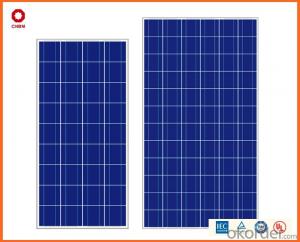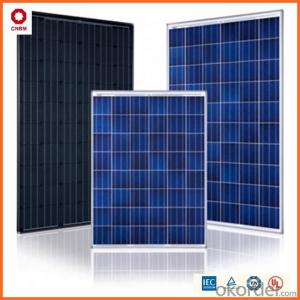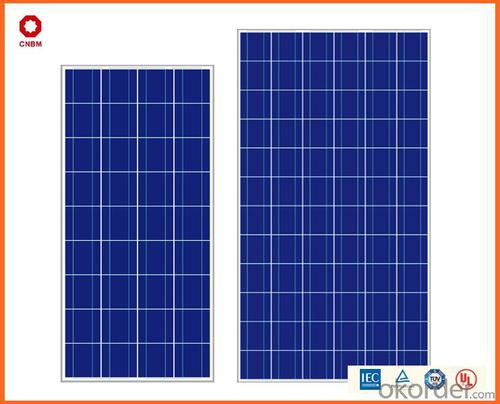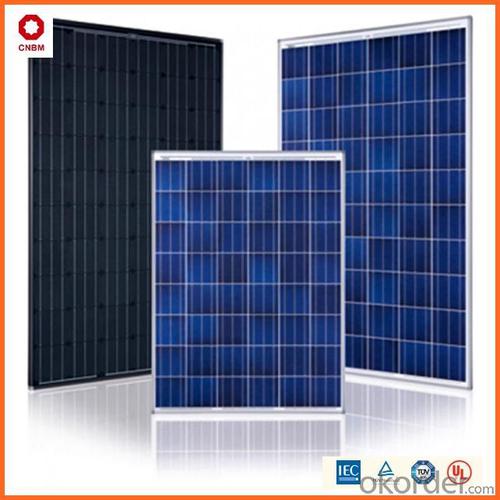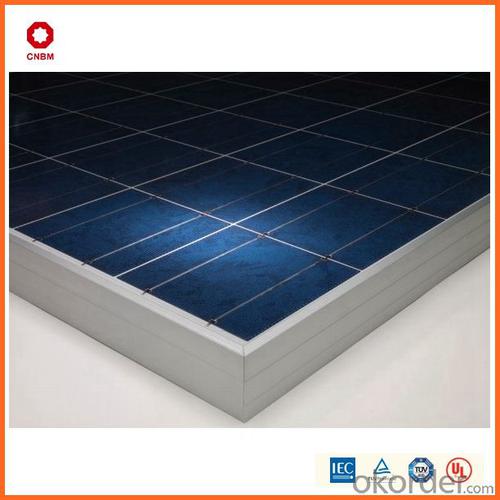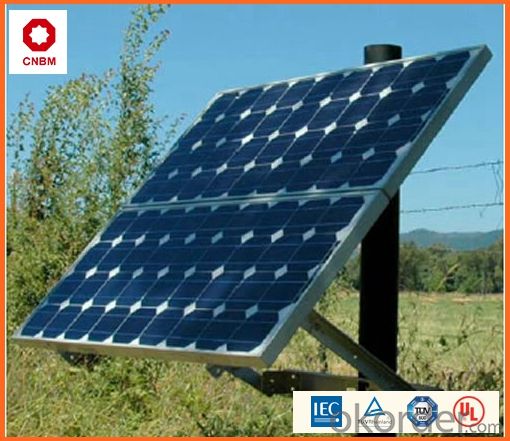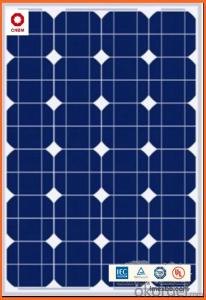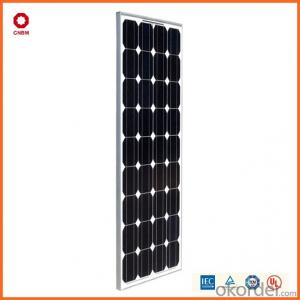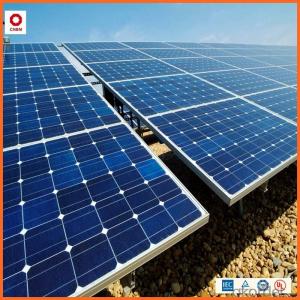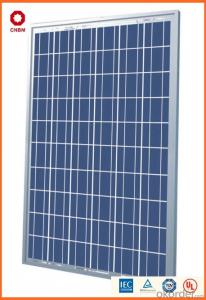Alpha Solar Energy Systems - Hot on Sale! Stock Small Solar Panel 75w with Good Quality
- Loading Port:
- China main port
- Payment Terms:
- TT OR LC
- Min Order Qty:
- 1 watt
- Supply Capability:
- 10000000 watt/month
OKorder Service Pledge
OKorder Financial Service
You Might Also Like
Product Description:
Hot Sale !!! Quality and Safety of Small Poly Solar Panel 35~85w
1. Rigorous quality control meets the highest international standards.
2. High-transmissivity low-iron tempered glass, strong aluminium frame.
3. Using UV-resistant silicon.
4. IS09001/14001/CE/TUV/UL
Warranties of Small Poly Solar Panel 35~85w
1. 10 years limited product warranty
2. 15 years at 90% of the minimal rated power output
3. 25 years at 80% of the minimal rated power output
Technical date of 45w-85w Poly Solar Panel
ITEM NO.: | Mono 125*125 cell ,36pcs . Power range from 80Wp-100Wp | ||||||||
Maximum Power(W) | 80 | 85 | 90 | 95 | 100 | ||||
Optimum Power Voltage(Vmp) | 17.81 | 17.89 | 17.94 | 17.99 | 18.06 | ||||
Optimum Operatige Current(Imp) | 4.78 | 4.91 | 5.12 | 5.35 | 5.59 | ||||
Open Circuit Voltage(Voc) | 21.98 | 22.05 | 22.14 | 22.28 | 22.45 | ||||
Short Circuit Current(Isc) | 4.95 | 5.15 | 5.36 | 5.65 | 5.84 | ||||
Solar Cell: | 125*125 Mono | ||||||||
Number of Cell(pcs) | 4*9 | ||||||||
Brand Name of Solar Cells | JA Cell, Bluesun Cell | ||||||||
Size of Module(mm) | 1580*808*35 | ||||||||
Caple & Connector Type | Pass the TUV Certificate | ||||||||
Frame(Material Corners,etc.) | Aluminium-alloy | ||||||||
Backing (Brand Type) | TPT | ||||||||
Cell Efficiency for 100W(%) | 15.8% | ||||||||
Weight Per Piece(KG) | 12.0KG | ||||||||
FF (%) | 70-76% | ||||||||
Junction Box Type | Pass the TUV Certificate | ||||||||
Tolerance Wattage(e.g.+/-5%) | ±3%, or 0-3% | ||||||||
Front Glass Thikness(mm) | 3.2 | ||||||||
Temperature Coefficients of Isc(%) | +0.04 | ||||||||
Temperature Coefficients of Voc(%) | -0.38 | ||||||||
Temperature Coefficients of Pm(%) | -0.47 | ||||||||
Temperature Coefficients of Im(%) | +0.04 | ||||||||
Temperature Coefficients of Vm(%) | -0.38 | ||||||||
Temperature Range | -40°C to +85°C | ||||||||
Surface Maximum Load Capacity | 2400Pa | ||||||||
Allowable Hail Load | 23m/s ,7.53g | ||||||||
Bypass Diode Rating(A) | 12 | ||||||||
Warranty | 90% of 10 years,80% of 25 years. | ||||||||
Standard Test Conditions | AM1.5 1000W/ 25 +/-2°C | ||||||||
Packing | carton or pallet | ||||||||
1*20' | 25 Pallets / 450pcs | ||||||||
1*40'STD | 25 Pallets / 100pcs | ||||||||
Features of our products:
• High conversion efficiency mono/poly-crystalline amorphous silicon solar cells
• Modules incorporate high performance bypass diodes to minimize the power drop caused by shading
• High transmittance, low-iron tempered glass
• High performance EVA encapsulant to prevent destroying and water.
• AI frame: without screw, corner connection. 8 holes on the frame can be installed easily
• Good performance of preventing from atrocious weather such as wind and hails
• Certifications: CE IEC TUV VDE UL, Class I
• 10 years 90% power output warranty

Shipping of Small Poly Solar Panel 35~85w
By Sea | Delivery from Shanghai or Ningbo seaport |
By Air | Departure from Shanghai Pudong Airport |
By Express | Post by DHL, EMS, UPS, TNT. |
- Q: Are there any risks of electrical grounding issues with solar energy systems?
- Solar energy systems can pose several risks due to electrical grounding issues. One major risk is the potential for electric shock, which occurs when the grounding system is not correctly installed or maintained. This can cause a buildup of electrical current, leading to contact with live electrical components and subsequent shock. Another risk is the possibility of fire. When the grounding system is improperly installed, it can result in electrical arcing, which can ignite a fire. This is especially hazardous as solar energy systems are often situated on rooftops, making it easier for a fire to rapidly spread throughout the entire building. Furthermore, a faulty grounding system can cause damage to the solar energy system itself. Without proper grounding, electrical surges and fluctuations can occur, harming sensitive components like inverters and batteries. To mitigate these risks, it is essential to ensure the proper installation and regular inspection and maintenance of the grounding system in a solar energy system. This involves using appropriate grounding equipment like grounding rods or conductors, as well as ensuring all connections are secure and free from corrosion. Regular testing should also be carried out to assess the effectiveness of the grounding system. It is advisable to enlist the services of a qualified professional for the installation and maintenance of the grounding system to minimize the hazards associated with electrical grounding issues in solar energy systems.
- Q: What is the role of solar-powered water heaters in solar energy systems?
- The role of solar-powered water heaters in solar energy systems is to utilize the sun's energy to heat water for various purposes such as domestic use or space heating. By harnessing the sun's energy, these heaters reduce reliance on fossil fuels, decrease carbon emissions, and contribute to a more sustainable and environmentally friendly energy system.
- Q: Can solar energy systems be used for powering electric cars or buses?
- Yes, solar energy systems can be used to power electric cars or buses. This can be achieved by installing solar panels on the vehicle or by utilizing solar power infrastructure to charge the vehicle's batteries. This renewable energy source offers a sustainable and environmentally friendly solution for transportation.
- Q: How does the performance of solar panels vary based on the type of installation?
- The performance of solar panels can vary based on the type of installation due to several factors. Firstly, the orientation and tilt angle of the solar panels play a crucial role in determining their performance. Ideally, solar panels should be installed facing south (in the Northern Hemisphere) or north (in the Southern Hemisphere) to maximize exposure to sunlight throughout the day. If the panels are not placed in the optimal direction, their energy production may be significantly reduced. Similarly, the tilt angle of the solar panels should be adjusted based on the latitude of the installation site. The tilt angle helps to maximize the amount of sunlight that hits the panels, especially during the winter months when the sun is lower in the sky. Incorrect tilt angles can result in reduced energy output and lower efficiency. The location and surroundings of the installation site also impact solar panel performance. Shading from nearby buildings, trees, or other obstructions can block sunlight and reduce the amount of energy generated. It is crucial to ensure that the installation site is free from any potential shading sources throughout the day. Furthermore, the type of installation also affects the performance of solar panels. There are various installation options available, including rooftop installations, ground-mounted systems, and solar tracking systems. Rooftop installations are the most common, but they can be affected by factors such as roof orientation, shading from neighboring buildings, and limited available space. Ground-mounted systems provide more flexibility in terms of orientation and tilt angle but might require additional land. Solar tracking systems, which follow the sun's path throughout the day, offer the highest energy production but are generally more expensive. Lastly, the quality and efficiency of the solar panels themselves can significantly impact their performance. High-quality panels with better efficiency ratings will produce more electricity from the same amount of sunlight compared to lower-quality panels. Investing in reputable brands and higher efficiency panels can result in improved overall performance. In conclusion, the performance of solar panels varies based on the type of installation, including factors such as orientation, tilt angle, shading, and the quality of the panels themselves. Properly installed panels in optimal conditions will yield higher energy production and increased efficiency.
- Q: How do solar energy systems contribute to job creation?
- Solar energy systems contribute to job creation in several ways. Firstly, the installation and maintenance of solar panels require skilled workers, such as electricians and technicians, creating employment opportunities in these sectors. Additionally, the manufacturing and supply chain of solar equipment employ a significant number of individuals. As the demand for solar energy continues to grow, so does the need for manufacturing, sales, and distribution jobs in the solar industry. Furthermore, the development and operation of large-scale solar farms create new positions in project management, engineering, and construction. Lastly, the shift towards renewable energy sources like solar power leads to a decrease in fossil fuel jobs but simultaneously opens up new prospects in the clean energy sector, fostering job growth and economic development.
- Q: How do solar energy systems affect the electrical grid?
- Solar energy systems can have both positive and negative effects on the electrical grid. On one hand, they contribute to the diversification of the energy sources, reducing reliance on fossil fuels and promoting sustainability. Solar power can also help meet peak demand during sunny periods, thereby reducing strain on the grid. However, the intermittent nature of solar energy production can create challenges for grid operators in balancing supply and demand. Excess solar energy during low demand periods may need to be curtailed or stored, while insufficient solar production during high demand periods may require backup power sources. Overall, solar energy systems require careful integration and management to ensure their optimal contribution to the electrical grid.
- Q: Can solar energy systems be used for air conditioning?
- Yes, solar energy systems can be used for air conditioning. Solar-powered air conditioning systems utilize the sun's energy to generate electricity, which is then used to power the air conditioning unit. This renewable energy source can help reduce electricity bills and minimize the environmental impact associated with traditional air conditioning methods.
- Q: How do solar energy systems impact the health and well-being of communities?
- Solar energy systems have a significant positive impact on the health and well-being of communities. One of the most significant benefits is the reduction in air pollution. Traditional energy sources such as coal and natural gas emit harmful pollutants that can cause respiratory problems, cardiovascular diseases, and even cancer. Solar energy systems produce clean and renewable energy, resulting in reduced air pollution and improved air quality. By reducing reliance on fossil fuels, solar energy systems also contribute to mitigating climate change. Climate change has numerous adverse health effects, including increased heat-related illnesses, the spread of infectious diseases, and food and water scarcity. Solar energy helps in reducing greenhouse gas emissions, which in turn helps to combat climate change and protect the health of communities. Moreover, solar energy systems have positive economic impacts on communities. They create job opportunities in the installation, maintenance, and manufacturing sectors. These jobs not only provide income but also contribute to the well-being of individuals and families. Additionally, solar energy systems can reduce electricity costs for households, freeing up financial resources that can be utilized for other essential needs, such as healthcare and education. Solar energy systems also enhance the resilience and reliability of energy supply in communities. They are decentralized and can be installed on rooftops or in smaller-scale installations, reducing the vulnerability of communities to power outages caused by natural disasters or infrastructure failures. This reliability ensures that critical services such as hospitals, schools, and emergency response centers can continue to function during power disruptions, ultimately protecting the health and safety of community members. Furthermore, solar energy systems promote energy independence and energy equity. Communities that have limited access to reliable electricity can benefit from solar energy systems, which can be installed in remote or underserved areas. This improves the quality of life for individuals in these communities by providing them with access to clean and affordable energy. In conclusion, solar energy systems have a profound impact on the health and well-being of communities. By reducing air pollution, mitigating climate change, creating jobs, enhancing energy resilience, and promoting energy equity, solar energy systems contribute to healthier and more sustainable communities.
- Q: Can solar energy systems be used in areas with limited access to solar mounting systems?
- Yes, solar energy systems can still be used in areas with limited access to solar mounting systems. In such cases, alternative mounting options like ground mounts, pole mounts, or even innovative solutions like floating solar panels can be employed to harness solar energy effectively. Additionally, advancements in solar technology have also made it possible to install solar panels on buildings or structures with unconventional designs, further expanding the possibilities for utilizing solar energy in areas with limited access to traditional mounting systems.
- Q: Can solar energy systems be used in areas with limited access to solar energy advocacy campaigns?
- Yes, solar energy systems can still be used in areas with limited access to solar energy advocacy campaigns. While advocacy campaigns can help raise awareness and support for solar energy, the installation and use of solar energy systems ultimately depend on the availability of sunlight. Even in areas with limited access to advocacy campaigns, solar energy systems can still be implemented as long as there is sufficient sunlight to generate electricity through solar panels. In fact, installing solar energy systems in such areas can bring numerous benefits, such as reducing reliance on fossil fuels, providing access to clean and renewable energy, and potentially lowering energy costs.
Send your message to us
Alpha Solar Energy Systems - Hot on Sale! Stock Small Solar Panel 75w with Good Quality
- Loading Port:
- China main port
- Payment Terms:
- TT OR LC
- Min Order Qty:
- 1 watt
- Supply Capability:
- 10000000 watt/month
OKorder Service Pledge
OKorder Financial Service
Similar products
Hot products
Hot Searches
Related keywords

